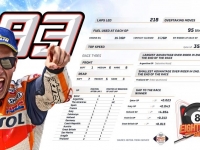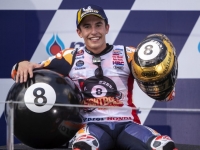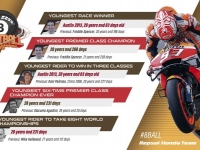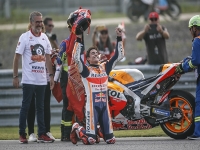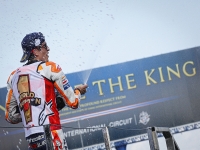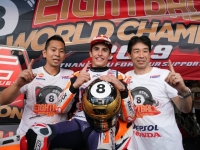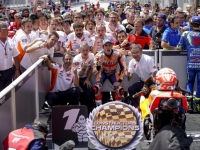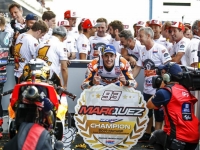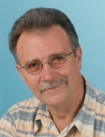Sport
Marc Marquez Inside the numbers of 2019 and Biography
Numbers and Biography of Marquez
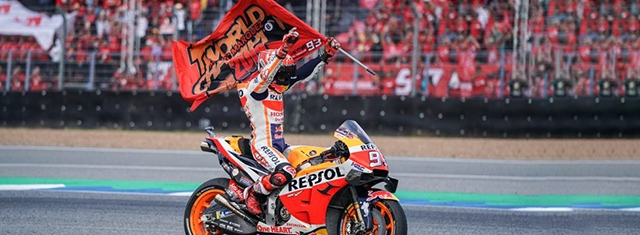
Marquez The Best 2019 (Quelle: Foto ReD Photographic Agency By Media Honda HRC)
Roberto Magni By Foto ReD Photographic Agency -
2019 has been one of Marc Marquez“™s most consistent to date, 14 races inside the top two and only once failing to score. As a result, his 325 points after round 15 are more than he amassed in the entirety of his 2016, 2017 and 2018 championship campaigns.
Leading 218 laps this year, Marquez has only once this season finished second by more than three tenths of a second. In fact, three of his five second place finishes were defined by less than 0.050s of a second. Marquez“™s determination to take victory was displayed front and centre in Buriram when he battled Fabio Quartararo to the line.
But not all his wins have been close; four of Marquez“™s nine wins have been won by more than two seconds. His greatest victory came in Argentina when he bounced back from his only DNF of the season to dominate and win by almost ten seconds.
BIOGRAPHY: From Cervera to potting the #8ball - the career of Marc Marquez
First steps (1993-2000)
On 17 February 1993, a future champion was born in Lleida, Spain. Marc has always lived in Cervera, a small town where he resides with his parents and brother Alex.
At age 4, Marc asked for a motorbike for Christmas, and with the aid of training wheels, he had his first riding experience. Just a year later he began to ride Enduro for kids.
By 2000 he was also competing in Motocross, finishing second that year before taking the Catalan Championship the following year.
From dirt to tarmac (2000-2007)
In 2002 Marc finished third in the Conti Cup as he began to focus on road racing. Two years later he tried a Honda 125 GP and immediately impressed.
The 2005 season saw Marquez join forces with Emilio Alzamora, 1999 125cc World Champion with Honda, winning the 125cc Catalan Championship, as well as the 85cc Catalan Supermotard Championship.
In 2006 he began participating in the CEV Championship and although he was unable to take the title, his performances were impressive and for 2008 he earned a full-time ride in the 125cc World Championship.
World Championship Debut (2008)
Marc debuted with the Repsol KTM Team in the 2008 and in just his sixth race, the British Grand Prix, he was able to achieve his first milestone in motorcycling history taking third position, becoming the youngest rider ever to make it onto a World Championship podium.
In 2009, again sporting the number 93 on his Repsol fairing to celebrate the year he was born, Marc demonstrated the talent that had impressed everyone. With a top-five finish in nearly every race, eyes were on Marquez for the following year.
First GP win and first World Championship Title (2010)
2010 saw Marquez join the Ajo Motorsport team riding a Derbi, and from the pre-season, he set a record pace, adapting well to his new bike and team. From then he was strong and took a career first win in Mugello and a string of further wins. With a good points advantage over title rival Nico Terol, Marquez entered the last round as the championship favourite and went on to secure the 2010 125cc World Championship at 17 with 10 wins and 12 poles.
Runner-up in Moto2 in his first year (2011)
Marquez moved to the new Moto2 class for 2011 after winning the 125cc title with a handpicked team, boasting engineers and mechanics with experience in Moto2 and MotoGP. After a rocky start, Marquez recovered and charged in to championship contention. With just a few rounds remaining he had recovered 82 points on Championship leader Stefan Bradl, but a crash in FP1 for the Malaysian race left him unable to compete in the final two events, forcing him to concede the title. His seven wins, three second places and one third place earned Marc the Rookie of the Year honour and the runner-up spot in the Moto2 World Championship.
Moto2 World Champion (2012)
After a difficult off-season recovering from injury, Marquez was able to pick up where he left off and won the season opener. Fine form continued and he took eight wins (in Qatar, Portugal, Holland, Germany, Indianapolis, Czech Republic, San Marino and Japan), two runner-up finishes (Catalunya and Great Britain) and two third places (Jerez and Aragon) on his way to the championship. The advantage gained throughout the season allowed him to clinch the crown in Australia, where he became the 2012 Moto2 World Champion.
MotoGP World Champion (2013)
There were huge expectations for what Marquez could achieve in his first season in MotoGP, and he immediately demonstrated that he was able to battle with the elite of the class. The young Spaniard scored his first podium in the first race. In Austin on 21 April 2013, he claimed pole and recorded his first MotoGP win in just his second race, becoming the youngest ever rider to win a premier-class GP, at the age of 20 years, 63 days, taking the record from Freddie Spencer (20 years 196 days).
Marquez continued to impress with pole positions and a near constant challenge for the podium as he regularly fought teammate Dani Pedrosa and Jorge Lorenzo. In Germany, he dominated the race and regained the Championship lead and continued his run of success, winning at Laguna Seca“”becoming the first rookie to win there in the premier class and becoming the youngest rider to win back-to-back premier-class races, at the age of 20 years, 154 days, taking another record from Freddie Spencer (21 years 104 days - South Africa and France GPs - 1983). He won again in Indianapolis, becoming the first premier-class rookie to win three back-to-back races since Kenny Roberts in 1978 (Austria, France and Mugello).
Marc took his fourth win in a row at Brno, becoming the first rider since Valentino Rossi in 2008 to win four or more successive races in the premier class and also the youngest rider to have won four successive premier-class Grand Prix races. It all came down to the final race of the year, Jorge Lorenzo and Marc Marquez separated by just 13 points as they lined up on the grid on Sunday. Riding a mature race and settling for a safe third, Marquez secured his first MotoGP World Championship in his maiden season and a new era began.
Back-to-back MotoGP Championships (2014)
Marc broke his leg during training after the first Sepang Test in 2014 and missed the second Sepang Test as well as the test at Phillip Island. He arrived in Qatar for round one with just three days on the bike but took pole in qualifying and won the race after an epic battle with Rossi. In Austin the young Spaniard led every session and won the race. In Argentina, he led all sessions apart from FP1 and again won the race. With three in a row, Marc was on a roll. He continued his dominance to the season“™s midway point, winning in Germany, and then made it 10 out of 10 with an Indianapolis win after the summer break. However, he couldn“™t quite manage 11 out of 11 and in Brno, teammate Dani took the victory with Marc finishing fourth.
Arriving in Japan with a 75-point advantage meant that he would seal the title if he finished in front of Pedrosa and lost no more than three points to Rossi and 15 to Lorenzo. His second-place Motegi finish and the 20 points that accompanied it delivered him his second MotoGP World Championship, becoming the first Honda rider to clinch a world title“”in any class“”at the Motegi circuit. He also became the youngest ever rider to win two consecutive premier-class World Championships at the age of 21 years, 237 days, taking the record from Mike Hailwood, who was 23 years, 152 days when he won his second successive 500cc title in 1963.
A challenging season (2015)
The 2015 season was Marc“™s third in MotoGP, and it proved to be more difficult than previous years. After the opening races did not go as planned, Marquez produced a stellar performance at the Spanish GP to close the gap in the Championship with a well-earned second place, but inconsistency in the following rounds left him with work to do.
Marc sealed a perfect weekend in Germany, recording a new race-lap record en route to victory, following his pole-position record, and he won again in Indianapolis. With these two consecutive victories, he was able to reduce his gap to 56 points behind Rossi. Crashing in Silverstone and Aragon essentially ended his title hopes, Marquez shifting his attention to winning as many races as possible for the remainder of the year. He concluded the 2015 season with a second-place finish in the Valencia GP and finished the year in third overall but with many valuable lessons learned.
#GiveMe5 (2016)
Marquez approached his fourth MotoGP campaign with a new mentality; consistency was the key. The season started well with a podium and two wins - including in Austin, which was quickly becoming one of Marquez“™s favourite circuits. More podiums followed as the World Championship returned to Europe, the Repsol Honda Team rider able to consistently battle at the front aside from a small blip in Le Mans. Marc“™s new mentality was displayed perfectly in Assen when he settled for second in the soaking rain behind fellow Honda rider Jack Miller. Summer came and was accompanied by a healthy 48-point lead over Lorenzo in the championship.
Consistency in the second half of the season saw Marquez able to steadily grow his points advantage over the Yamaha pairing of Rossi and Lorenzo. The chance of sealing a fifth title at Honda“™s home race in Motegi was small, but a magnificent ride and mistakes from his two rivals saw the 23 year old take his third MotoGP World Championship in front of Honda President Chief Executive Officer and Representative Director Mr. Takahiro Hachigo, who joined him on the podium, Honda Operating Officer and Director Mr. Shinji Aoyama and HRC President Mr. Yoshishige Nomura. At the age of 23 and 242 days, he became the youngest-ever rider to win three premier-class World Championship, taking the record from Mike Hailwood who was 24 years 108 days when he won his third successive 500cc title in 1964.
The #Big6 (2017)
Marc Marquez“™s start to the 2017 MotoGP Championship as defending World Champion was not an easy one as he finished the first two races without a podium - the first time since 2011 that this had happened. But victory in Austin, his fifth in a row at the track, began to shift the tides and Marquez gained ground on Maverick Viñales before an unfortunate fall in Le Mans and struggles in Mugello. In an incredibly close championship, each weekend was unpredictable and Marc would have to wait until Sachsenring for his second win of the year.
Action resumed in Brno and Marquez put on a flag-to-flag master class, extending his championship lead over Viñales to 14 points. The following rounds saw Andrea Dovizioso emerge as a late title contender, the duo heading to the Asian Triple with the championship wide open. An epic Japanese GP in the pouring rain saw Marquez take his 100th career podium and arrived at the final round of the year in Valencia with a 21-point lead. A third place was all he needed to surpass Mike Hailwood (25 years and 107 days old) as the youngest rider to achieve four premier class World Championships - achieving this in Valencia at the final round of the year.
Reaching #Level7 (2018)
After a less than ideal start to his title defence in 2018, Marc Marquez proved he was without a doubt the rider to beat in 2018 with three straight victories in Austin, Jerez and Le Mans. This impressive run was soon followed by eight consecutive podium finishes, including a further four wins.
After taking victory in the first ever MotoGP race held in Thailand, Marquez enjoyed a comfortable 77-point lead ahead of Andrea Dovizioso in second. Again, Marquez had a chance to wrap up his fifth MotoGP title in six years during Honda“™s home Grand Prix at Twin Ring Motegi (where he had also clinched his second and third premier-class titles, in 2014 and 2016, respectively). Despite qualifying only sixth on the grid at Twin Ring Motegi, Marquez scored a brilliant victory, earning his eighth win of the season, the seventh world title of his career and his fifth MotoGP World Championship in six years writing another chapter in the sport“™s history books.
The #8ball (2019)
The 2019 MotoGP season started in almost ideal fashion with a second place and a victory from the first two races but disaster struck at Marquez“™s beloved Circuit of the Americas, failing to finishing and ending his stranglehold on the Austin track. After this Marquez became a permanent fixture of the top two steps of the podium, finishing first or second in the next 12 races. All eyes were on the defending World Champion as he arrived at Sachsenring where he put Austin behind him to take his tenth straight pole and victory at the track.
Marquez“™s incredible consistency in 2019 saw him finish the first 14 rounds with a staggering 300 points - more points than he had scored throughout 2016 and 2017 on his way to the title. Round 15 of 19, the Grand Prix of Thailand, presented Marquez with his first chance at the title. Once again it was Andrea Dovizioso who stood between Marquez and a sixth premier class crown with the Repsol Honda Team rider needing to out score the Italian by two points. With Dovizioso in fourth, a thrilling battle broke out between Marquez and Fabio Quartararo - Marquez taking victory in the last corner of the last lap. After stunning nine race wins in 2019, Marc Marquez lifted the 2019 MotoGP World Championship - his eighth world title and sixth in the premier class. In doing so he becomes the youngest rider to take six premier class World Championships and the youngest rider to take eight World Championships.
weitere Informationen: https://www.redmagazine.red
Für den Artikel ist der Verfasser verantwortlich, dem auch das Urheberrecht obliegt. Redaktionelle Inhalte von GDN können auf anderen Webseiten zitiert werden, wenn das Zitat maximal 5% des Gesamt-Textes ausmacht, als solches gekennzeichnet ist und die Quelle benannt (verlinkt) wird.

